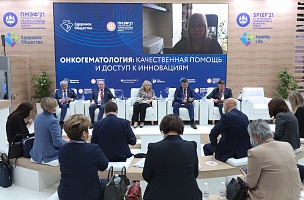Key findings
Digitalization will allow a more rapid response to needs for medicines
“Our main tool is the use of data. We have to be very precise about the needs of the healthcare system and our future forecasting [...] We are now moving towards an experiment to create a unified register with information about prescriptions and the dispensation of medicines. This will enable us to see and assess both current and prospective needs, allowing us to take into account both events that have already taken place as well as clinical guidelines. We have a system for monitoring the movement of medicines which allows us to rule out overspending and the emergence of substandard products. All together, these tools will give us a complete picture and an understanding of the true needs of the healthcare system in the near future”, said Victor Fisenko, First Deputy Minister of Health of the Russian Federation.
The pharmaceutical market needs constant dialogue and increased connectivity
"It is very important for manufacturers to communicate with the healthcare system and members of the medical community, such as chief freelance specialists, colleagues from the Ministry of Health, and colleagues from the regions, to receive feedback on products and the areas of dissatisfaction with medicine. If the medical community points them out to the industry, this is an additional, but very important tool for shaping the offering. If everyone works together to fine-tune the product that is needed, it will be both in demand and useful”, said Dmitry Galkin, Director of the Department for Development of the Pharmaceutical and Medical Industry at the Ministry of Industry and Trade of the Russian Federation.
"When we talk about more coherence in decision-making, there should not be separate registration of medicines, separate medical practices, which can only be based on one particular system, and separate registration of prices. These things should all be interlinked. This is also a tool for analysis. And that is the thing! For example, the atomization of a doctor as a source of medical practice and the rejection of statistically significant data and international best practice, which develops all over the world, can lead to completely different results in terms of pricing”, said Timofey Nizhegorodtsev, Deputy Head of the Federal Antimonopoly Service of the Russian Federation.
Drug prices remain the subject of intense scrutiny by the authorities
"We can argue about the system of state regulation of prices for medicines and criticize it at length, but one of the functions of state regulation is price containment. We also use this system to mitigate social risks, because drug affordability is made up of territorial, assortment, and pricing availability”, said Victor Fisenko, First Deputy Minister of Health of the Russian Federation.
"Our approach is indicator-based. We take a look at the price of the same medicine from the same manufacturer in competitive markets. And we look at what price they offer us. If we see a difference, we then say: no, guys, we cannot accept this price, which is very different from competitive markets that are smaller than ours. This allows us to have a discussion. Why? Because if we start looking at a drug from the inside, through the prism of costs, we can be charged what they want”, said Timofey Nizhegorodtsev, Deputy Head of the Federal Antimonopoly Service of the Russian Federation.
PROBLEMS
"There are always huge risks of price changes. The question now, under new economic sanctions, is whether the price is good enough or not. But, on the other hand, you have to make decisions with approved budgets […] and then the producers say that the price is not profitable for them. We have to reregister it, and the question arises: where can we get the money to provide for citizens as quickly as possible? There are social consequences of such decisions, which are not made by companies in advance, but according to the situation. For this reason, of course, forecasting should be done much earlier”, said Elena Maksimkina, Director of the Federal Center for Planning and Regulation Of Medical Supply Circulation of the Ministry of Health of the Russian Federation.
Remote trade in medicines will be expanded
"Many people say that approximately 15% of pharmacies will go bankrupt in the near future. In the Tambov Region, we have the largest rural population in the Central Federal District, a 40/60 ratio, and the largest ageing population. Even if the cities manage to level this out, it is very difficult in the villages, because logistically it will be more expensive. That is why we propose to allow for the licensing of itinerant sales to medical workers at mobile medical complexes”, Galina Shemanaeva, Acting Deputy Head of the Tambov Regional Administration, said.
SOLUTIONS
"We have made fairly rapid steps. In previous years, there were long discussions about distance selling. The practice of distance selling has begun, and more than five hundred positive decisions have been issued to date, if I am not mistaken. […] We are now working on an experimental legal regime for the distance selling of prescription drugs as well. This is the next step toward improving accessibility. At the end of 2021, we practically equalized the medical licence with the pharmacy licence for territorially separate facilities, i.e. for urgent care centres and outpatient clinics in those localities where we do not have pharmaceutical organizations. Almost all regions have licensed all their urgent care centres falling under this category during the first quarter of 2022”, said Victor Fisenko, First Deputy Minister of Health of the Russian Federation.
"There is a risk that we won’t be able to import medicines that do not have Russian equivalents. On this, we have a proposal to create a stock of such medicines at the federal level, taking into account requests from the regions. National distributors that are logistically able to do this will create a timely drug supply", said Galina Shemanaeva, Acting Deputy Head of Tambov Regional Administration.
The state is taking over the production of cheap but necessary medicines
"There is a group of drugs, which are socially important or have a low margin, and the state should take over production. The existing balancing mechanisms do not work for some very low-margin but highly demanded products in the low- and mid-price segments. We are launching quite a large number of these projects, and by 2024–2025, one way or another, they will all be implemented”, said Dmitry Galkin, Director of the Department for Development of the Pharmaceutical and Medical Industry at the Ministry of Industry and Trade of the Russian Federation.






